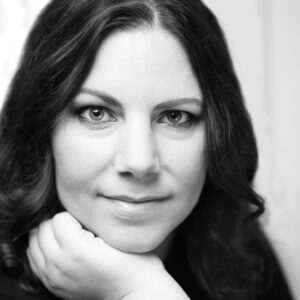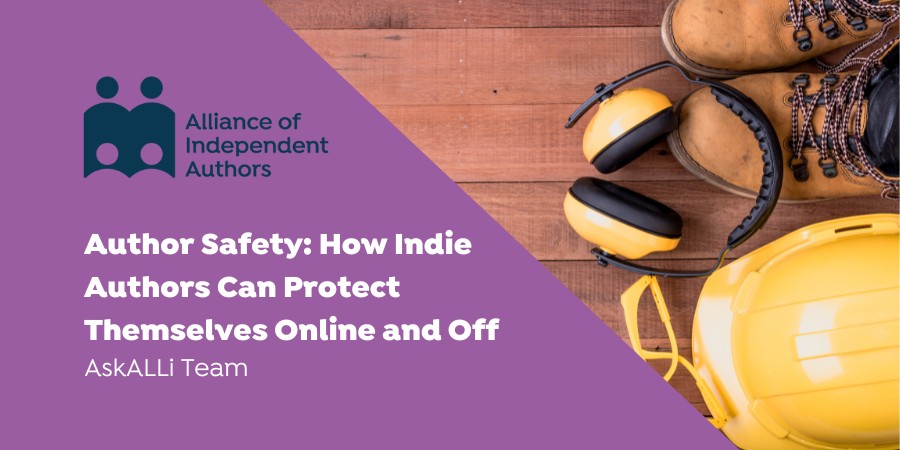
Orna Ross, Director of ALLi
The shocking but unsurprising attack on Salman Rushdie has raised questions about the safety of authors and led the Alliance of Independent Authors to bring forward a planned Member Handbook. ALLi Director Orna Ross explores the issue of author safety.
Everyone at the Alliance of Independent Authors extends our very best wishes to Salman Rushdie and we are all greatly relieved that he is on the way to recovery.
For a writer to persist in spite of mortal threats intended to intimidate, silence and terrorise him, as Rushdie has done, takes great courage. For more than 30 years, Rushdie has done his work under a widely publicized assassination order, since Iran’s Ayatollah Ruhollah Khomeini ruled that “The Satanic Verses” was blasphemous and that its author should be murdered.
Riots, bombings, other killings ensued around the globe. For Rushdie, it meant ten years of government protection, secret homes, seclusion from his readers, and eventually, a gradual return to public life. And now this.
His decision to speak at Chautauqua without a regiment of guards was not careless or foolish, as some have suggested. Knowing the risks, he made another decision to espouse the quality of life he was determined to live, and assert his belief in the value of intellectual exchange about difficult topics.
Little wonder he has become a role model for writers right now, for it isn't just the world-famous who are subjected to threats and harassment and worse, online and off, for speaking truth to power, or voicing opinions others would rather not hear.
We are all vulnerable to attack these days if we speak out, from online trolling and harrassment, threats and insults, all the way to stalking and physical attacks. Many of us know what it is like to receive a social media message from someone claiming they intend to rape or kill us. Some of us have actually experienced such attempts.
Self-publishing authors who are highly visible as both author and publisher of their work, may be the most vulnerable.
Author Safety: Book Angel Survey
In 2017, spurred by reports of social media harassment, the Bookseller and PenAmerica conducted safety in publishing surveys. Neither of these surveys focused on authors, in particular. Earlier this year, book club BookAngel became concerned, when one of their writers mentioned disturbing experiences with safety issues and personal data, and several others joined in.
Some of the stories were harrowing, and while most fans are not a problem, some of the group had come close to reliving Misery in their own lives.
Says Book Angel: “This behaviour seemed a lot wider spread than we had known. Among one writer’s group we worked with, every member had been subjected to harassment, and more concerningly, no one had said anything because they all thought they were the only one.
To find out exactly how widespread the issue is, they undertook a survey which ran from 1st February to 31st March 2022, and covered author harassment, stalking, privacy and more. They recently published the survey results. Some headline findings were:
- 63% of respondents thought that less than one quarter of authors were harassed. 73% of them had actually been harassed.
- 28% of all respondents had suffered serious safety issues, including physical threats and criminal action due to writing.
- The 28% of serious threats include arson attacks, kidnapping attempts, assault or theft at signings, and going after author’s families in their day to day lives. Identity theft and credit card fraud were also reported.
Arising from this, at ALLi, we took the decision to put together a brief handbook to educate our author members, advisors, ambassadors and team about author safety issues, and to begin some simple but, we hoped, effective protective steps.
We also took the call that we did not wish to give too much “oxygen” to these concerns, mainly because the people who cause these safety concerns might be trigger to attack more authors, online or in real life. Instead, we took several internal steps and aimed to publish a supportive short member handbook this autumn.
What happened to Rushdie, however, made us rethink this strategy. Hence we brought forward our publication of this guide, and created this blog post (see below)
 Melissa Addey, ALLi's Campaign manager says:
Melissa Addey, ALLi's Campaign manager says:
We will now ensure the ALLi Author Safety: Member Handbook is available in several locations across our website.
We also urge you to share it beyond ALLi, to any author friends you feel may need it. Safety goes beyond membership and we want all authors to be safe.
These steps are not a guarantee of safety, nothing ever can be, but they go some way towards addressing potential gaps in our protection of ourselves. All writers should be free to write without being attacked for their work. (see below for ALLi author safety recomendations)
Author Safety: No Panic
As ever, balance is key. The Book Angel survey found that many authors say no to opportunities because they fear the resultant loss of privacy. But many of us do not.
Says ALLi's news editor, Dan Holloway, reporting on the issue in his column:
As writers, we are an infinitely diverse community, and our expectation of safety when we share our words varies greatly across location, across community, and across genre.
When we think we are getting into dry or esoteric debate over whether writers should be “allowed” to write about communities they are not a part of, we can too easily forget that in many countries LGBTQ+ writers, for example, can only write about their own experience by breaking the law and placing themselves in direct danger.
And the science fiction and fantasy communities have been keenly aware of the risks posed to women who write in these genres at comic cons and other events since Gamergate.
[But] Even in these times when we are pushed into the public eye, whether at events or online, for the sake of sales; or even into the eye of controversy for the sake of clicks, many of us move in a world that is fundamentally safe.
Many of us in the writing community do not live in fear because of our words. Some of us do. As a community, we can come together to expand the number of the former and decrease the latter.
Author Safety: Alliance of Independent Authors
At ALLi, we work hard to support our members, and to work for better representation and ethical treatment of indie authors. This includes working for author protection and safety.
As an organisation, we celebrate the freedom of expression and oppose censorship. We deplore bullying, trolling, personal comments, harassment and threats, and condemn any kind of racist, sexist, classist, or ageist hate speech or actions, but we rarely speak out publicly on individual cases. (This is an exception).
We do, however, provide private support for indie authors targeted by trolls, so do contact us for support and guidance if you are affected.
Authors are opinionated creatures, and we welcome difference of opinion that are expressed with respect. We have an author Code of Standards and Ethical Author Policy and Program and we encourage members to report violations of these policies.
Author Safety: ALLi Recommendations
These are the five key steps we recommend for all authors and, in italics, what ALLi is doing to help:
1 Be informed but not frightened.
Make time to read all the information given here and implement the tips given, without getting overly anxious. The more steps we all take, and the greater the collective awareness and support, the better.
ALLi has put together an Author Safety Member Handbook, and is making it freely available to all authors.
2 If you are the recipient of any incidents, Record and Tell:
a. Keep a record of all incidents (including things like screenshots).
b. Tell people: your writing organisation, the admins of writing forums you are
part of, your friends and family, the police, the platform being used by the
person making you feel unsafe (with these last two, make sure there is a
record of your complaint/report).
You can always tell us at ALLi as well, whether you are a member of ours or not.
3 Protect your home address
a. Buy domain privacy for your website as part of your hosting package: it is not expensive and domain registration data is one of the easiest ways to find out your address. https://www.hostpapa.co.uk/blog/web-hosting/7-reasons-why-you-need-domain-privacy-protection/
b. Use a PO Box wherever your address is required (e.g. at the foot of your newsletter). Look for one where you only pay if you receive mail, if that’s an option in your country. Ask local writers for recommendations.
c. Be careful what you post online or elsewhere related to your location. Lots of
small pieces of information can add up.
d. PayPal was cited as being problematic (harassers used Paypal invoices to trace authors’ real identities behind business accounts). Check what information may be visible on the payment options you choose.
e. As an additional protection, you may wish to use a contact form rather than
give out your email address on your website, as this can be easily found and
used by hackers.
4. Do not disclose your earnings without anonymising them.
Within the self-published community it is common for authors who are seeing success on their publishing journey to share exact figures on writing forums, in part to override the existing
‘starving artist’ mythology so prevalent in publishing, in part to then explain what they did that might help their peers. It is an inspiring and honest thing to do and much valued, especially by new authors, but was clearly raised as a potential trigger for problematic responses (it may be seen as boasting or an indicator that someone is financially worth blackmailing).
We recommend that you anonymise the data and, for example, ask admins on a platform to post the information for you, so that it can still be shared to benefit others.
ALLi has committed to always anonymising such data in our own communications and would always be glad to post anonymised success stories on an author’s behalf.
5. If your pen-name is for safety rather than a marketing choice, take steps to protect it.
Use an avatar rather than your real image, check how payments will work to protect your anonymity, etc. Publishing contracts should clearly state who is and is not allowed to know your identity details: there should be a privacy clause included and restrictions over who can access the name behind an author’s pen-name.
Both ALLi and our literary agent Ethan Ellenberg have committed to always checking this issue when looking at contracts.
Author Safety and Freedom of Speech
Salman Rushdie was one of 100 high-profile authors including Martin Amis, Margaret Atwood, Jeffrey Eugenides and Gloria Steinem, who signed an open letter some time ago, protesting “”ideological conformity” and the spread of “censoriousness”, including “an intolerance of opposing views” and “vogue for public shaming and ostracism” in which institutional leaders are issuing “hasty and disproportionate punishments instead of considered reforms” in “a spirit of panicked damage control” in response to “perceived transgressions of speech and thought”.
“Editors are fired for running controversial pieces; books are withdrawn for alleged inauthenticity; journalists are barred from writing on certain topics; professors are investigated for quoting works of literature in class; a researcher is fired for circulating a peer-reviewed academic study; and the heads of organizations are ousted for what are sometimes just clumsy mistakes.
Whatever the arguments around each particular incident, the result has been to steadily narrow the boundaries of what can be said without the threat of reprisal. We are already paying the price in greater risk aversion among writers, artists and journalists who fear for their livelihoods if they depart from the consensus, or even lack sufficient zeal in agreement.
“This stifling atmosphere will ultimately harm the most vital causes of our time. The restriction of debate, whether by a repressive government or an intolerant society, invariably hurts those who lack power and makes everyone less capable of democratic participation.
The way to defeat bad ideas is by exposure, argument, and persuasion, not by trying to silence or wish them away. We refuse any false choice between justice and freedom, which cannot exist without each other.
As writers we need a culture that leaves us room for experimentation, risk taking, and even mistakes. We need to preserve the possibility of good-faith disagreement without dire professional consequences. If we won’t defend the very thing on which our work depends, we shouldn’t expect the public or the state to defend it for us.”
The best way we can honor Rushdie and his work is to be brave in our own work and to recognise that the moment we declare a set of ideas to be immune from criticism, satire, derision, or contempt, freedom of thought and free expression of thought become impossible.





These are really important and effective ways, especially when today many authors are violent or attacked by their writings or propaganda.
Hallo, thank you deeply for the valuable content and advice. Where can I buy this book, please? The ALLi Author Safety: Member Handbook. Thank you very much. Ursula Nieuwoudt, [email protected], South Africa
Excellent article. Authors, as well as everyone else, need to help protect our freedom of speech.